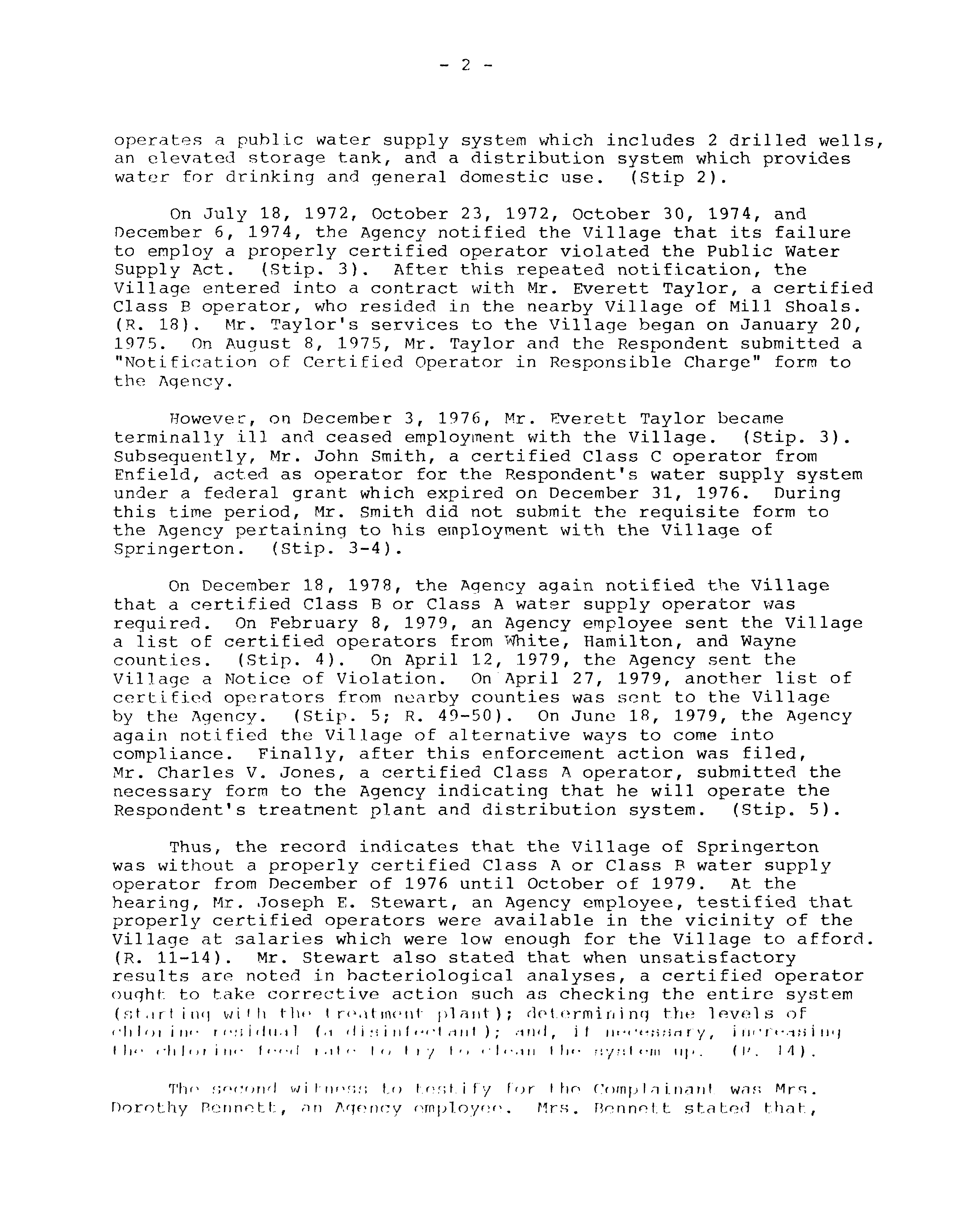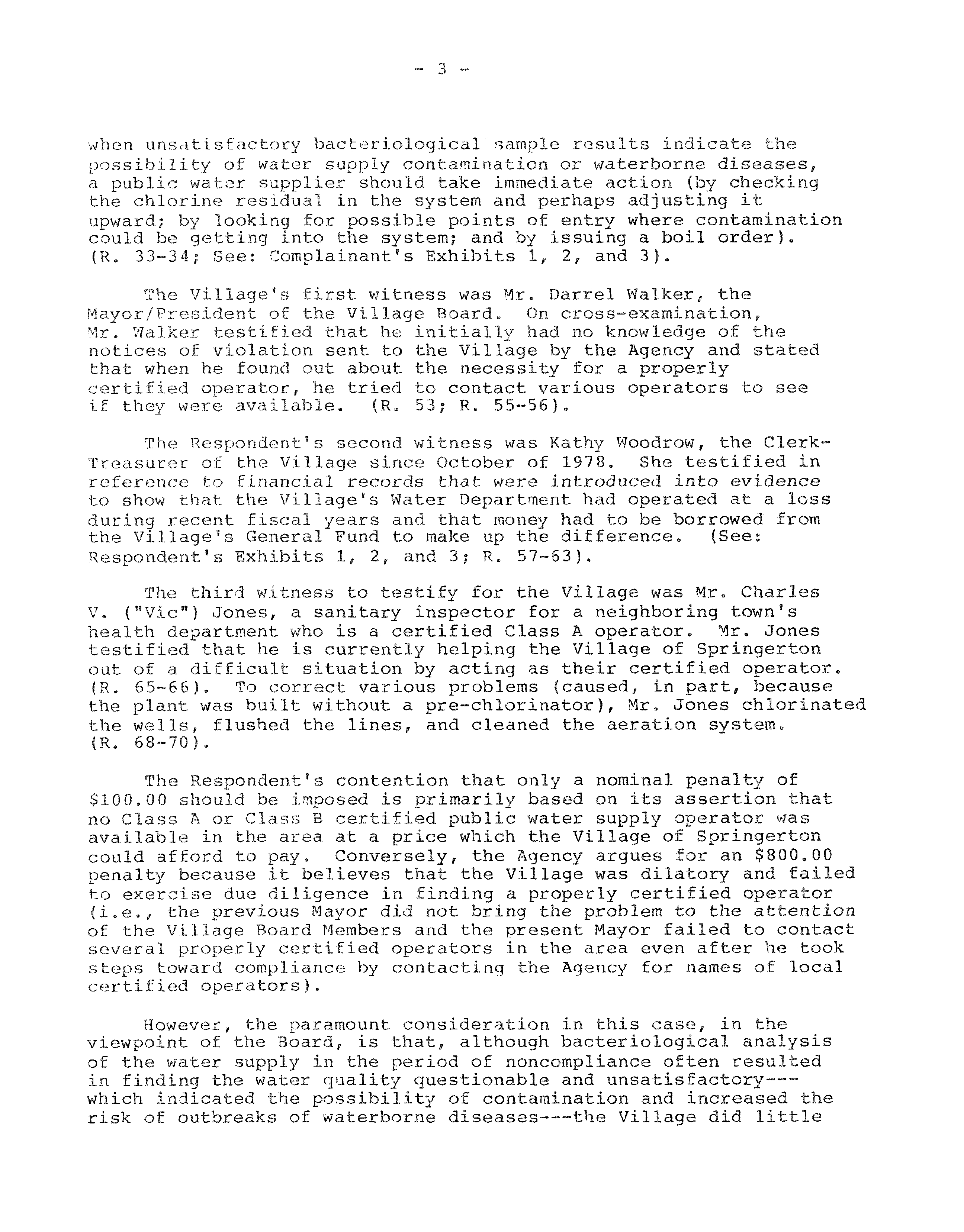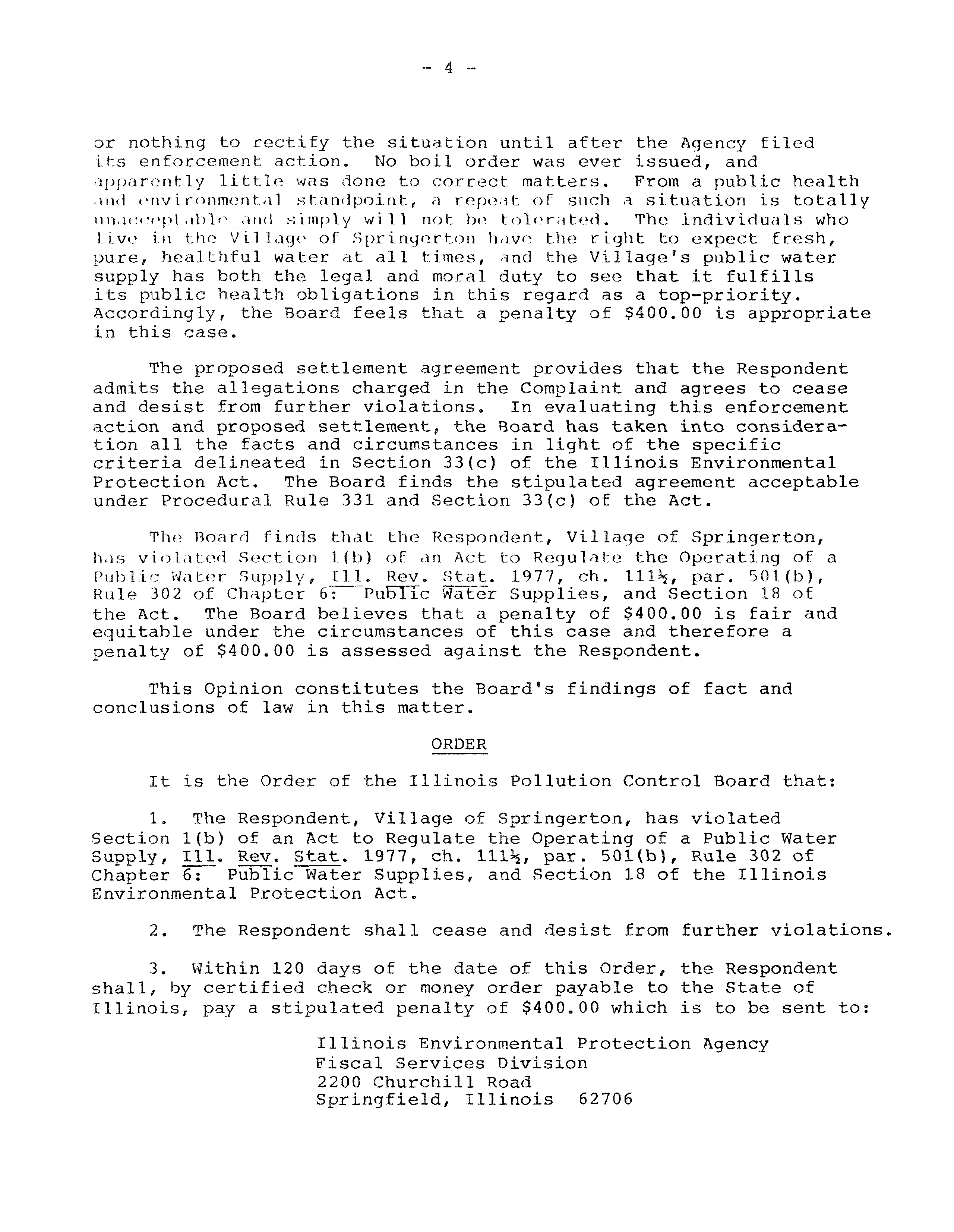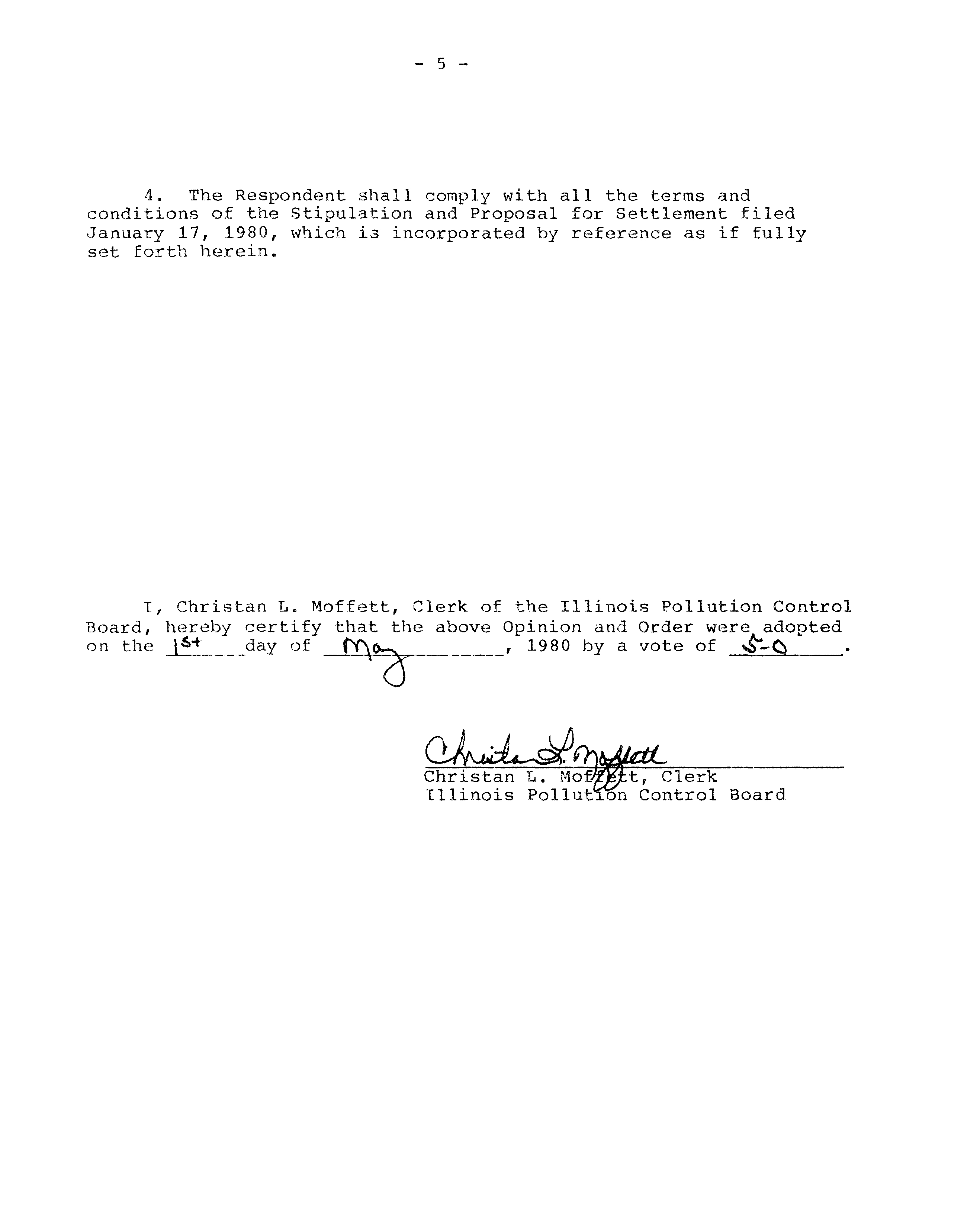ILL INOIS
P0 EJLUT ION
CONTROL
BOARD
May
1,
1980
ILLINOIS
ENVIRONMENTAL
PROTECTION
AGENC~(,
Complainant,
v.
)
PCB 79—208
VILLAGE
OF SPRINGERTON,
)
Respondent.
MS.
CIR~STINE~
S.
ZEMAN, ASSISTANT ATTORNEY G~MERAL, APPEARED
ON
HEHAJJP
OP
THE
COMPLAINANT.
MR.
DAVID
STANLEY,
ATTORNEY
POR
THE
VILLAGE
OP
SPRINGERTON,
APPEARED
ON
BEHALF
OP
THE
RESPONDENT.
OPINION AWD ORDER OF THE
BOARD
(by
Mr.
Werner):
This matter comes before the Board on the October
3,
1979
Complaint brought by
the
Illinois Environmental Protection Agency
(“Agency”)
which alleged that the Respondent owned
a public water
supply
system
which
was
operated
from
December
6,
1976
until
October
3,
1979 with
rio certified Class B or Class
A water supply
operator
in violation of Section 1(b)
of an Act
to Regulate the
Operating of a Public Water Supply,
Ill.
Rev. Stat.
1977,
ch.
111½,
par.
501(b),
Rule 302 of Chapter
6:
Public Water Supplies, and
Section
18 of the Illinois Environmental Protection Act
(“Act”),
A hearing was held on January
17,
1980.
The parties filed a Stipulation and Proposal for Settlement
on January
17,
1980.
However,
the parties were unable to agree on
a proposed penalty, and therefore presented testimony and evidence
at the hearing pertaining to the penalty
issue and filed post—hearing
closing briefs which summarized their respective positions on the
appropriate amount of the penalty.
In its brief,
the Agency
recommended a penalty of $800.00
*
On the other hand,
the
Respondent contended
in its brief that a nominal penalty of $100.00
was appropriate.
The Respondent, Village
of Springerton (“Village”),
which
is located
in
White
County,
Illinois,
is
a small village with a
population
of
about
228
individuals.
The
Respondent
owns and
—2—
operates
a public water supply system which includes
2
drilled wells,
an elevated storage tank, and a distribution system which provides
water for drinking and general domestic use.
(Stip 2).
On July 18,
1972,
October 23,
1972,
October 30,
1974,
and
December
6,
1974,
the Agency notified the Village that its failure
to employ a properly certified operator violated the Public Water
Supply Act.
(Stip.
3).
After this repeated notification, the
Village entered into a contract with
Mr.
Everett Taylor,
a certified
Class
B operator,
who resided in the nearby Village of Mill Shoals.
(H.
18).
Mr.
Taylor’s services to the Village began on January 20,
1975.
On August
8,
1975,
Mr. Taylor and
the Respondent submitted a
“Notification
of
Certified Operator in Responsible Charge”
form to
the Aqency.
However,
on December
3,
1976,
Mr.
Everett Taylor became
terminally
ill and ceased employment with the Village.
(Stip.
3).
Subsequently,
Mr. John Smith,
a certified Class
C operator from
Enfield, acted as operator for the Respondent’s water supply system
under
a federal grant which expired on December
31,
1976.
During
this time period,
Mr.
Smith did not submit the requisite form to
the Agency pertaining to his employment with the Village of
Springerton.
(Stip.
3—4).
On December
18,
1978, the Agency again notified the Village
that
a certified Class
B or Class
A water supply operator was
required.
On February
8,
1979,
an Agency employee sent the Village
a list of certified operators from White, Hamilton, and Wayne
counties.
(Stip.
4).
On April
12,
1979,
the Agency sent the
Village
a Notice of Violation.
On April
27,
1979,
another
list of
certified operators from nearby counties was sent
to the Village
by
the Aqency.
(Stip.
5;
R.
49—50).
On June
18,
1979,
the Agency
again notified the Village of alternative ways to come into
compliance.
Finally, after this enforcement action was filed,
Mr. Charles V. Jones,
a certified Class
A operator,
submitted the
necessary
form to the Agency indicating that he will operate the
Respondent’s treatment plant and distribution
system.
(Stip.
5).
Thus,
the record indicates that the Village of Springerton
was without
a properly certified Class
A or Class
B water supply
operator from December of 1976 until October of 1979.
At the
hearing,
Mr.
Joseph
E.
Stewart,
an Agency employee, testified that
properly certified operators were available
in the vicinity of the
Village at salaries which were low enough for the Village to afford.
(R.
11—14).
Mr.
Stewart also stated that when unsatisfactory
results are noted
in bacteriological
analyses,
a certified operator
ought:
to
take
corrective action such as checking the entire system
(~:t~rtinq wi~N
r~(~neti1plant);
dotormir~inqthe levels
of
In~
~
(.i
d~~jn1~~’’t
inf
);
~ind,
~ t
J~*~i;~1ry.
i
I
1
J
it
I
I
I
I
~
I
i
I
I
iii
I
I
•~ii
(
4
)
TIi
(~(‘(~()rtd
Wi
Irtn~
Li)
fy
Pr
I
Fin
(u;np
71
inant
was
Mrs.
r)orot:hy
Pert
not:
I:
,
rt n
Aqe
ncv
nmployen
.
Mrs
.
Pen
no L t:
sta L~d t:ha I:
—3
when unsatisfactory bacteriological• sample results indicate the
possibility of
water
supply contamination or waterborne diseases,
a public water supplier should take immediate action (by checking
the chlorine residual in the system and perhaps adjusting it
upward; by looking for possible points of entry where contamination
could be getting into the system; and by issuing a boil order).
(a.
33—34; See: Complainant’s Exhibits 1,
2, and 3).
The Village’s first witness was Mr. Darrel Walker, the
Mayor/President of the Village Board.
On cross—examination,
Mr. Walker testified that he initially had no knowledge of the
notices of violation sent to the Village by the Agency and stated
that when he found out about the necessity for a properly
certified operator, he tried to contact various operators to see
if they were available.
(R.
53; R.
55—56).
The Respondent’s second witness was Kathy Woodrow,
the Clerk—
Treasurer of the Village since October of 1978.
She testified in
reference to financial records that were introduced into evidence
to show that the Village’s Water Department had operated at a loss
during recent fiscal years and that
money
had to be
borrowed
from
the Village’s General Fund to make up the difference.
(See:
Respondent’s Exhibits 1,
2, and 3; R. 57—63).
The third witness to testify for the Village was Mr. Charles
V.
(“Vic”) Jones, a sanitary inspector for a neighboring town’s
health department who is a certified Class A operator.
Mr. Jones
testified that he is currently helping the Village of Springerton
out of a difficult situation by acting as their certified operator.
(R.
65—66).
To correct various problems (caused, in part, because
the plant was built without a pre-chlorinator), Mr. Jones chlorinated
the wells, flushed the lines, and cleaned the aeration system.
(R.
68—70).
The Respondent’s contention that only a nominal penalty of
$100.00 should be imposed is primarily based on its assertion that
no Class A or Class B certified public water supply operator was
available in the area at a price which the Village of Springerton
could afford to pay.
Conversely, the Agency argues for an $800.00
penalty because it believes that the Village was dilatory and failed
to exercise due diligence in finding a properly certified operator
(i.e.,
the previous Mayor did not bring the problem to the attention
of the Village Board Members and the present Mayor failed to contact
several properly certified operators in the area even after he took
steps
toward
compliance
by contacting the Agency for names of local
certified operators).
However, the paramount consideration in this case,
in the
viewpoint of the Board,
is that, although bacteriological analysis
of the water supply in the period of noncompliance often resulted
in finding the water quality questionable and unsatisfactory-——
which indicated the possibility of contamination and increased the
risk of outbreaks of waterborne diseases——the Village did little
—4—
or nothing
to rectify the situation until after
the Agency filed
its enforcemenl: action.
No boil order was ever issued,
and
aJ)parent:ly
little was
done
to correct matters.
From a public health
nd
utv i ronmen
t a
1
5 Li
iitlpoint
,
a
repoi t: of
such a situation
is totally
11111
~tept
,ible
arid
simply
will
not:
be
~olerat:ed.
The
individuals
who
I
Lye
15
t:he
V
i1
iLiqe
of
S~)riflgertofl
liriVO the r i~g1it
to
expect
fresh,
pure,
healthful water
at all
times,
and the Village’s public water
supply has both the
legal and moral duty to see that it fulfills
its public health obligations in this regard
as a top—priority.
Accordingly,
the Board feels
that a penalty
of $400.00
is appropriate
in this case.
The proposed settlement agreement provides that the Respondent
admits the allegations charged
in the Complaint and agrees to cease
and desist from further violations.
In evaluating this enforcement
action and proposed settlement, the Board has taken into considera-
tion all the facts and circumstances in light of the specific
criteria delineated
in Section 33(c)
of the Illinois Environmental
Protection Act.
The Board
finds the stipulated agreement acceptable
under Procedural Rule 331 and Section 33(c) of the Act.
The
Board
finds
that
the
Respondent.,
Village
of Springerton,
his vi
olat:ed
Sect ~on 1(b)
oF
an
Act
to Regulal:e the Operating of
a
Pubite
Water Supply,
11,
Rev.
Stat.
1977,
ch.
111½,
par.
501(b),
Rule 302 of Chapter
6:
Pu1311c Water Supplies,
and Section 18 of
the Act.
The Board believes that a penalty
of $400.00 is fair and
equitable under the circumstances of this case and therefore
a
penalty
of $400.00 is assessed against the Respondent.
This Opinion constitutes the Board’s findings of fact and
conclusions of law in this matter.
ORDER
It
is the Order of the Illinois Pollution Control Board that:
1.
The Respondent,
Village of Springerton,
has violated
Section 1(b) of an Act to Regulate the Operating of a Public Water
Supply,
Ill. Rev.
Stat.
1977,
ch.
111½,
par.
501(b3, Rule 302 of
Chapter
6:
Public Water Supplies, and Section
18 of the Illinois
Environmental Protection Act.
2.
The Respondent
shall cease and desist from further violations.
3.
Within 120 days of the date of this Order,
the Respondent
shall,
by certified check or money order payable to the State of
Illinois,
pay a stipulated penalty of $400.00 which
is
to be sent to:
Illinois Environmental Protection ~gency
Fiscal Services Division
2200 Churchill Road
Springfield,
Illinois
62706
—5—
4.
The Respondent shall comply with all the terms and
conditions
of the Stipulation and Proposal for Settlement filed
January
17,
1980,
which is incorporated by reference as
if fully
set
forth herein.
I, Christan
L. Moffett, Clerk of the Illinois Pollution Control
Board, hereby certify that the above Opinion and Order were adopted
on the j~day
of
~
1980 by a vote of
__________
O
Christan L. Mof~tt, Clerk
Illinois Pollut’~’6nControl Board.





